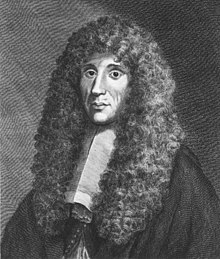Francesco Redi

Francesco Redi (born February 18, 1626 in Arezzo , † March 1, 1697 in Pisa ) was an Italian doctor, parasitologist and toxicologist as well as a humanistic philosopher and poet.
Life
Francesco Redi, son of a Florentine doctor, began his training with the Jesuits , studied in Pisa and received his doctorate in philosophy and medicine. In 1648 he came into contact with the students of Galileo Galilei in Florence and became a member of the Collegio Medico and the Accademia dei Cimento . He was the personal physician of Fernando de 'Medici (1599–1648) and responsible for the grand-ducal pharmacies.
Act
Redi became known through an experiment in 1668, which was an important step in the refutation of abiogenesis ( Generatio spontanea , spontaneous generation). At the time, maggots were believed to arise naturally in decaying flesh. In his experiment, Redi took three containers and filled them with meat. He closed one container completely, left the second container open and covered the third container with gauze . Maggots only appeared in the open, but not in the closed container. He found maggots (developing) on the gauze of the third container.
He continued his experiments by capturing maggots and waiting for them to evolve. They did and became ordinary flies. If you put dead flies or maggots in sealed meat pots, no new maggots were created. But if you did this with live flies, maggots appeared in the flesh. This refuted the theory of abiogenesis.
Thereupon Redi formulated the famous sentence: "Omne vivum ex ovo." ('All life arises from an egg.').
Francesco Redi is recognized as the founder of helminthology.
Redi also studied the otter venom.
Redi was also a poet. His best known work is Bacco in Toscana . Since 1655 he was a member of the Florentine Accademia della Crusca , in which he held the office of Arciconsolo from 1678 to 1690 . He was also one of the main authors of the 3rd edition of the Vocabolario der Crusca and left numerous additions, notes and comments that were used in the preparation of the next edition (1729-1738). Some of his writings have been included as references in various editions of the dictionary.
A crater is named after him on Mars , and a street each in Florence and Arezzo.
Works
- Osservazioni intorno alle vipere . Florence 1664 (digitized) . - Observationes de viperis… ex italica in latinam translatae . S. l., Approx. 1670 (digitized version)
- Esperienze intorno alla generazione degl'insetti. Florence 1668.
- Esperienze intorno a diverse cose naturali. Florence 1671.
literature
- Gabriele Bucchi, Lorella Mangani: Redi, Francesco. In: Raffaele Romanelli (ed.): Dizionario Biografico degli Italiani (DBI). Volume 86: Querenghi-Rensi. Istituto della Enciclopedia Italiana, Rome 2016, with references to further contributions to Redi on treccani.it.
- Barbara I. Tshisuaka: Redi, Francesco. In: Werner E. Gerabek , Bernhard D. Haage, Gundolf Keil , Wolfgang Wegner (eds.): Enzyklopädie Medizingeschichte. De Gruyter, Berlin / New York 2005, ISBN 3-11-015714-4 , p. 1221.
Web links
- Publications by Francesco Redi in the Opac des Servizio Bibliotecario Nazionale (SBN)
- Standard entry in the Opac of the SBN
- Publications by and about Francesco Redi in VD 17 .
- Francesco Redi's private website (Italian)
Individual evidence
- ↑ In the literature there are also other information such as 1694 and 1698. 1698 is explained by the use of the Calculus Pisanus , which calculates the year from March 25th by one unit. Schullian (1974) provides arguments for the date of death March 1, 1697; see. Dorothy May Schullian (Ed.): The Baglivi correspondence from the library of Sir William Osler . Cornell University Press, Ithaca 1974.
- ↑ a b c Francesco Trevisani: Francesco Redi , in: Wolfgang U. Eckart and Christoph Gradmann (eds.): Ärztelexikon. From antiquity to the present , 3rd edition 2006, Springer Verlag Heidelberg, Berlin, New York pp. 271 + 272. Medical glossary 2006 , doi : 10.1007 / 978-3-540-29585-3 .
- ↑ Barbara I. Tshisuaka: Redi, Francesco. 2005, p. 1221.
- ↑ Membership database of the academy
| personal data | |
|---|---|
| SURNAME | Redi, Francesco |
| BRIEF DESCRIPTION | Italian doctor, naturalist, author |
| DATE OF BIRTH | February 18, 1626 |
| PLACE OF BIRTH | Arezzo |
| DATE OF DEATH | March 1, 1697 |
| Place of death | Pisa |
